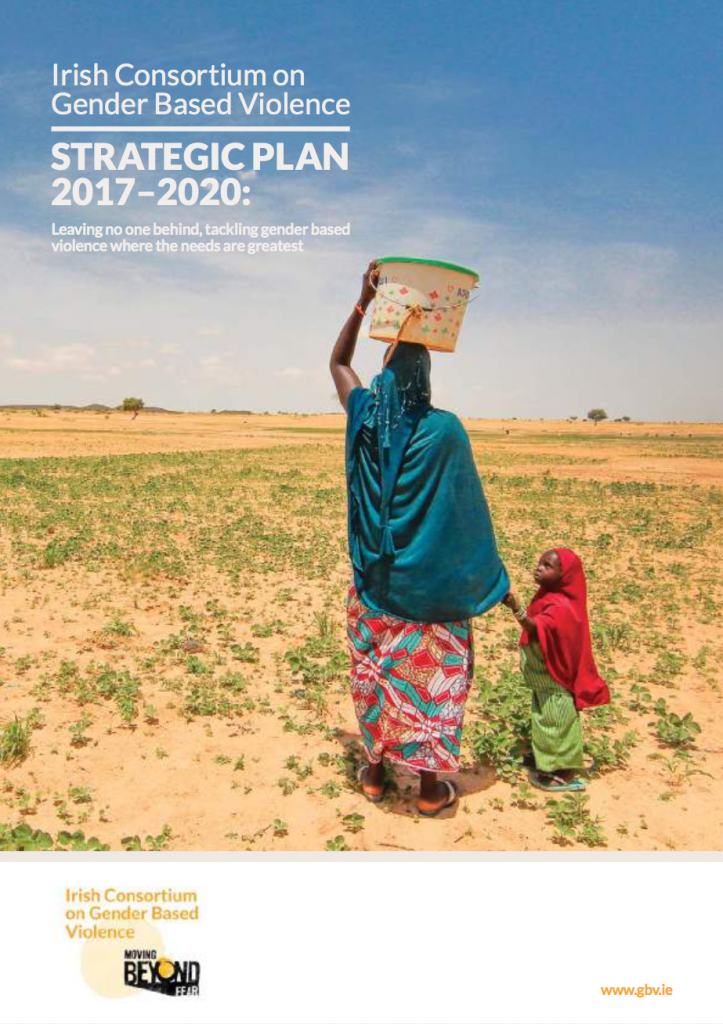
All posts by adam
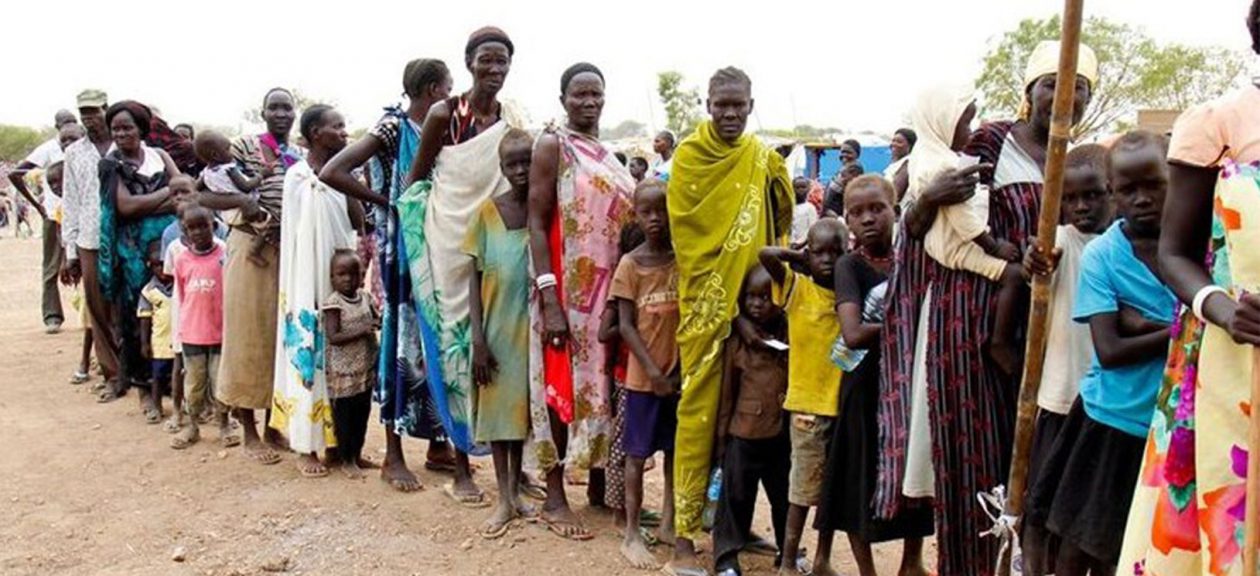
Launch of ICGBV report; Women, War and Displacement
A review of the impact of conflict on gender based violence
In response to the extremely high levels of conflict and displacement currently experienced globally, the Consortium has produced a paper highlighting the connection between conflict, displacement and gender based violence entitled ‘Women, War and Displacement.’
- Location: William Jefferson Clinton Auditorium, UCD Belfield, Dublin 4
- Time & Date: 1pm – 2.30pm, Wednesday 16th November 2016
- Registration details can be found at our Eventbrite site
Women, War & Displacement
The Irish Consortium on Gender Based Violence would like to invite you to the launch of their report on Women, War and Displacement. The report illustrates the connection between heightened conflict, displacement and increased levels of gender based violence, and argues for a more robust gendered dimension of GBV response in the Global Compacts on Migration and Responsibility Sharing for Refugees, to be produced over the next two years. In addition, case studies drawn from the programmes of ICGBV membership agencies are featured in the document, giving voice to women who have experienced gender based violence as a result of conflict and displacement. As part of the launch we will be holding a roundtable discussion on conflict, displacement and gender based violence, and the gendered dimension of the refugee crisis. ICGBV was formed in 2005 and brings together Irish humanitarian and development organisations, Irish Aid and the Irish Defence Forces, in an effort to combat gender based violence.
The Irish Consortium on Gender Based Violence would like to invite you to the launch of their report on ‘Women, War and Displacement’. The report illustrates the connection between conflict, displacement and gender based violence, and argues for a more robust gendered dimension of GBV response in the Global Compacts on Migration and Responsibility Sharing for Refugees, to be produced over the next two years. In addition, case studies drawn from the programmes of ICGBV membership agencies are featured in the document, giving voice to women who have experienced gender based violence as a result of conflict and displacement.
As part of the launch we will be holding a roundtable discussion on conflict, displacement and gender based violence, and the gendered dimension of the refugee crisis.
ICGBV was formed in 2005 and brings together Irish humanitarian and development organisations, academic institutions, Irish Aid and the Irish Defence Forces, in an effort to combat gender based violence.
- Nora Owen (moderator) former minister for Justice and current chair of the Irish Oversight Group on UN Resolution 1325: Women, Peace and Security.
- Siobhan Foran – Adviser to the Red Cross Red Crescent Gender and Diversity Network (Irish Red Cross)
- Sotiria Kyriakopoulou – ActionAid Greece Protection Programme Manager
- Lt Commander Erika O’ Leary – Irish Naval Service Gender Advisor
- Christine Karumba – Co-Founder & Executive Director at PLEDGE: Project for Leadership in Economic Development, Gender & Education

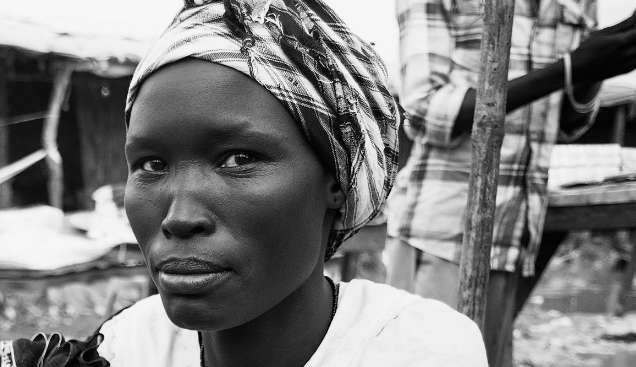
Report: Women, War and Displacement
A review of the impact of conflict on gender based violence. Download
Case Studies
Christian Aid and Partners
Irish Red Cross
ActionAid Hellas
Concern Worldwide
World Vision Ireland
Trócaire
Oxfam Ireland
Irish Aid
Defence Forces Ireland
Plan International Ireland
GOAL
Gorta Self Help Africa
Kimmage Development Studies Centre
Contact Information
Concern Worldwide, 52-55 Camden Street Lower, Dublin 2.
t: +353 1 417 7775
For specific enquiries relating to ICGBV activities contact Coordinator: abby.ryan@gbv.ie
For more general enquiries contact info@gbv.ie
For media or press queries contact media@gbv.ie
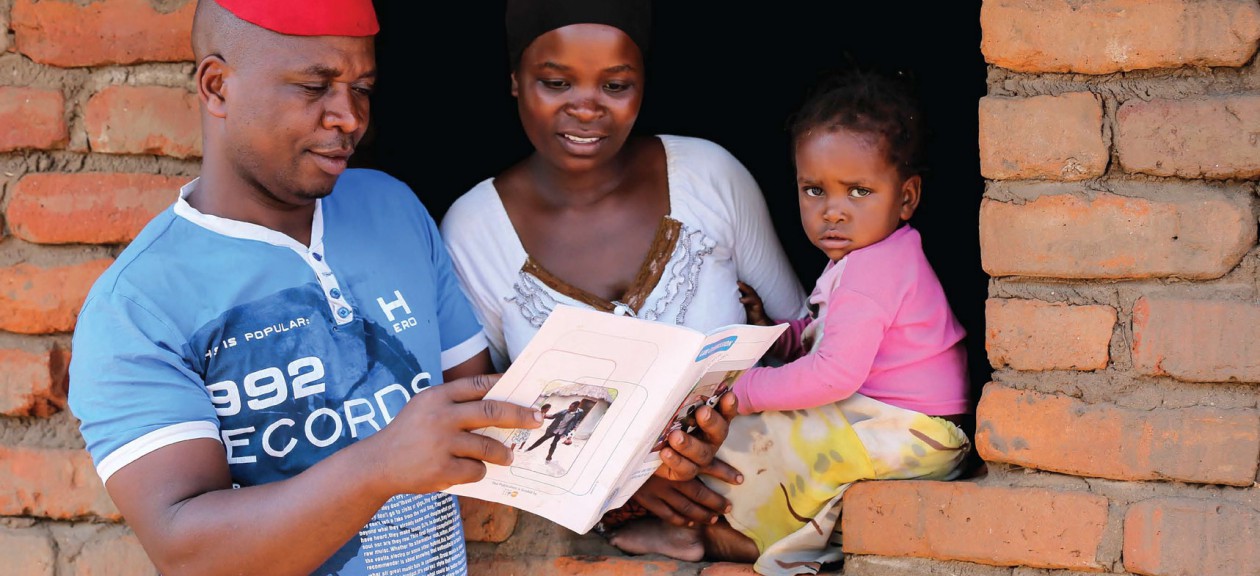
Duniya Mike
Duniya Mike, is 25 years and lives in Chindungwa village in the Salima District. She has three children, one boy and two girls aged between six months and seven years. She married her husband Mike in 2007. Duniya describes that period as one of hardest moments in her life: “He was hitting me, and when he had money he spent that money on other ladies. During my first pregnancy, I told him we should go to the hospital together for a HIV test but he refused and was very angry with me.”
In 2011, MIAA (Malawi Interfaith Aids Association) with Trócaire support, implemented a program called “Tiyeni Tisinthe, Together Let’s Change”, in Salima. The programe aims to reduce women’s vulnerability to HIV infection through gender transformative interventions and the elimination and modification of harmful cultural and religious practices. Mike was approached in 2012 to participate in training on gender and HIV. Within a few months of his attendance, Duniya began to notice real changes. “When he came from the training, he shared with me what he had learnt there. He doesn’t hit me anymore, he is a different man. Before, he would spend all the money with other girls but now he brings the money home and we sit together to make a proper budget.
“Nowadays, I am a happy woman. He helps me at home because with 3 children is not easy. I feel he is the man I fall in love. I have him back, thanks to MIAA.”
- This case study was prepared as part of the Gallery Exhibition to commemorate the visit of the President of the Republic of Ireland, His Excellency Michael D Higgins to Malawi in November 2014, and later to coincide with the launch of the 16 Days of Activism against GBV on November the 25th, 2014.
- Pictures taken by: Chipiliro Khonje.
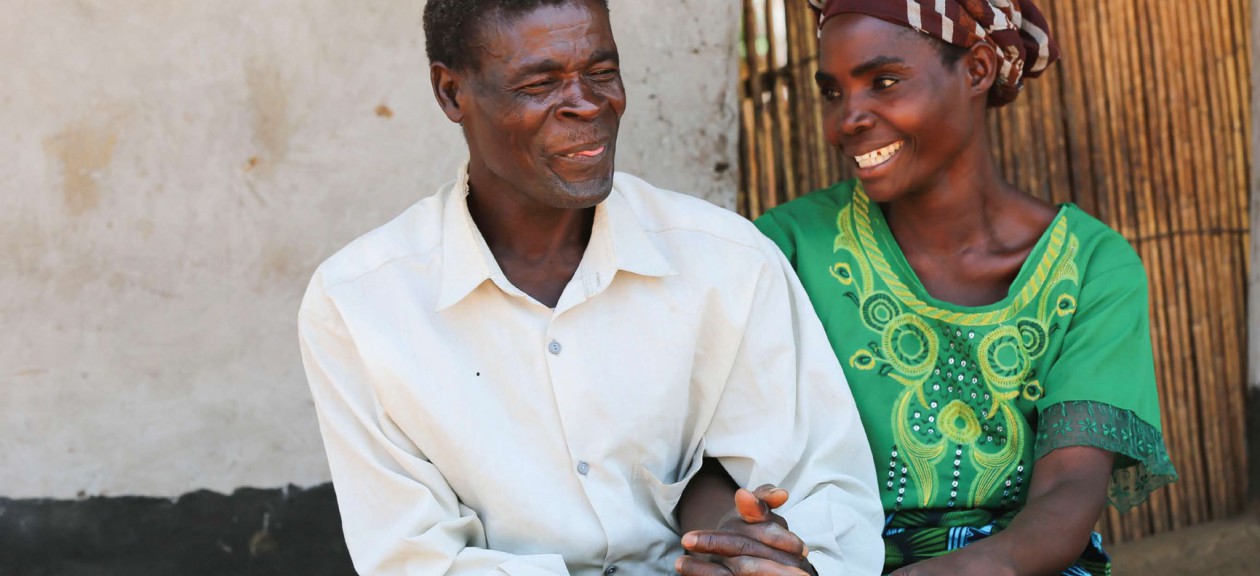
Ezinta Mzoze
Ezinta Mzoze lives in Mpopela in the Salima District. She is unsure when she was born. Ezinta is a farmer with 4 children, two girls and two boys. She never attended school.
Ezinta married her husband Grevinson in 1989 but immediately experienced problems. She says: “My husband preferred beer to me most of the time.” Rather than financially supporting his family, he spent all their money getting drunk. He was extremely violent, frequently beating Ezinta. In 2013 Grevinson was invited to take part in a program called ‘Let’s Change Together’ implemented in Salima District by Malawi Interfaith Aids Association with Trócaire support. The program trains men to conduct peer outreach education on gender and HIV; Grevinson is now a male motivator promoting the rights of women and girls in the surrounding areas.
Ezinta says “I’m proud of him. He’s changed completely. He has stopped beating me, he’s stopped drinking: We now grow our crops together, he gives me money to buy all the things I need for the house”
During her last pregnancy Grevinson accompanied her on all her pre natal visits and they found out their HIV status. They now both counsel and support others to live positively with HIV.
Eliza says “ I want to continue to walk side by side with my husband this makes me happy. I want more people to benefit from this intervention, many women live in hell as I did, but their lives can too change for the better.”
- This case study was prepared as part of the Gallery Exhibition to commemorate the visit of the President of the Republic of Ireland, His Excellency Michael D Higgins to Malawi in November 2014, and later to coincide with the launch of the 16 Days of Activism against GBV on November the 25th, 2014.
- Pictures taken by: Chipiliro Khonje.
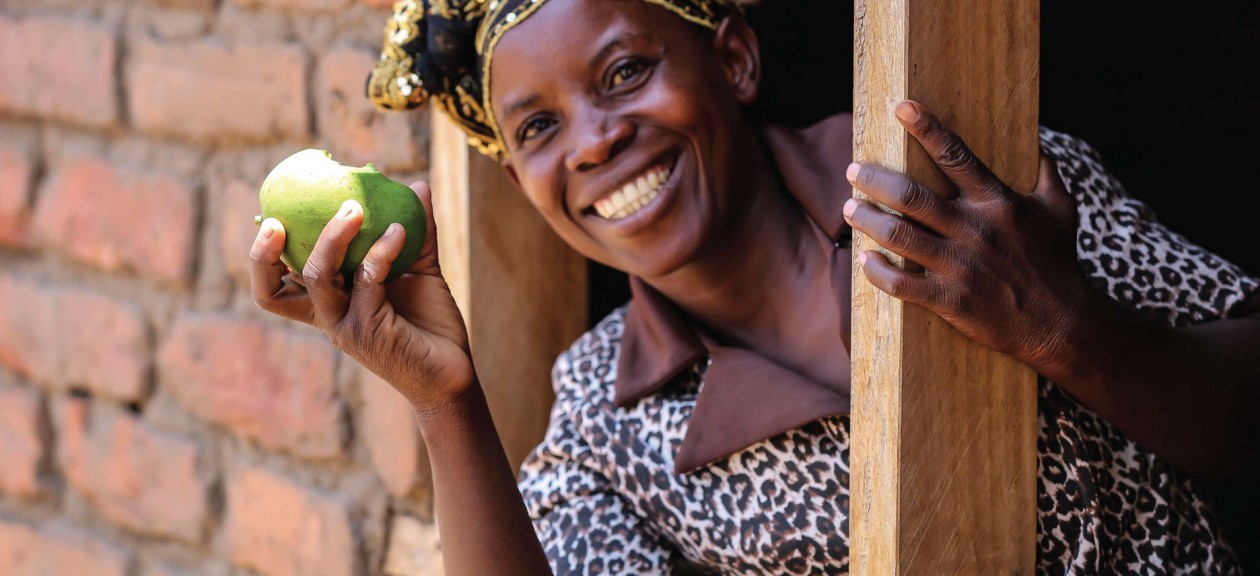
Duniya M’bwana
Duniya M’bwana lives in Nysanguzu village, in the Salima district. She is unsure of her age, her mother died on the same day she was born. She is married with 5 children and one grandchild. Duniya is a subsistence farmer. She married in 1998 but her husband never cared or supported her. She struggled financially to provide food for her children.
Duniya tells us that her relationship with her husband was difficult, “we worked together in the fields, but the only noise was the birds singing and the sound of our hoes tilling the earth. He would come home, and eat his own food whilst I ate with my children in another room. We were together but living separate lives.”
Duniya’s husband twice left his family for South Africa to have a better life, and earn money, both times he returned with no money, or gifts for his children. She was very disappointed but could not speak out as she was afraid of him.
In 2012 Duniya’s husband participated in MIAA and Trócaire Tiyeni Tisinthe project which offered training on Gender and HIV. As a result Duniya says he “learned to be a husband and father, he has apologized for treating me badly, he talks to me and shares his feelings. In turn I do the same. Now, my children are happy because they see their parents happy. Now, he takes care of me and our children. I feel I have someone. I know I am not alone in the world.”

- This case study was prepared as part of the Gallery Exhibition to commemorate the visit of the President of the Republic of Ireland, His Excellency Michael D Higgins to Malawi in November 2014, and later to coincide with the launch of the 16 Days of Activism against GBV on November the 25th, 2014.
- Pictures taken by: Chipiliro Khonje.
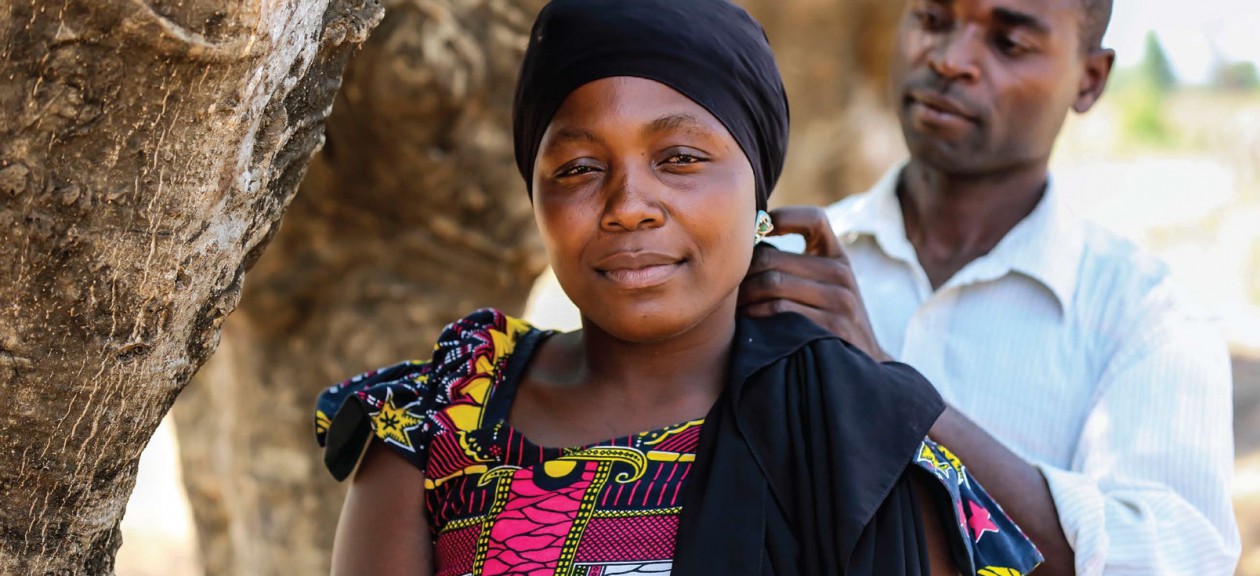
Edrina Kenamu
Edrina Kenamu, is 28, and chief of Kandusiwa Village, in Salima District. She has 3 children, all girls, and is educated to primary school level. People in her village respect and like her and it’s easy to understand why. Her smile is contagious and she speaks with the confidence of a leader.
Edina married at 19 but her relationship was not harmonious. “When I married my husband was going out every day. I knew he was cheating on me. I was scared because our family was at risk of HIV infection. We stopped having sex. I felt bad and I felt unloved. I wondered if I should leave, I almost started an affair with another man.”
Her husband explains their violent home life. “I was beating her and I believed I had that right because I am a man. I was wrong. She took the beatings but in turn beat our children, perhaps she had learned this from me.” After nine years of this, things changed dramatically when Edrina’s husband joined MIAA and Trócaire Tiyeni Tisinthe program in Salima.
Edina says “It was the best thing that happened to me, to us. My husband stopped going out, and staying away and he started to help me at our home. I never thought that was possible. I am living in a dream. We sit together and we discuss everything, even sex. We trust each other now. There is no more violence in our home and we teach our children they too must live this way”
- This case study was prepared as part of the Gallery Exhibition to commemorate the visit of the President of the Republic of Ireland, His Excellency Michael D Higgins to Malawi in November 2014, and later to coincide with the launch of the 16 Days of Activism against GBV on November the 25th, 2014.
- Pictures taken by: Chipiliro Khonje.
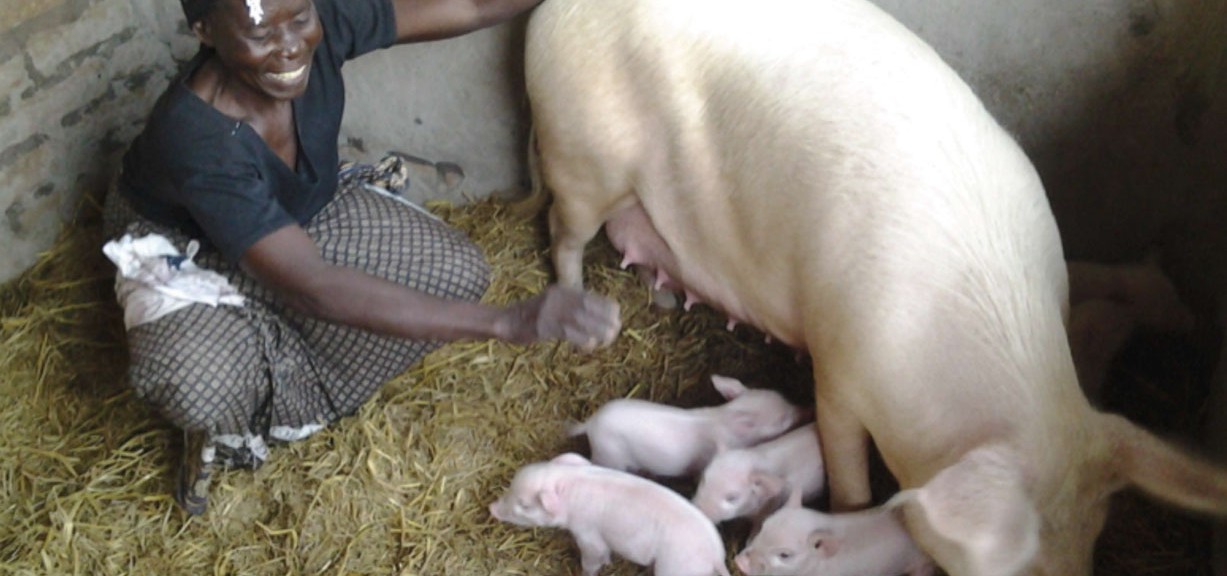
Nellie Mhango
Nellie is 61 years old and lives in Karonga district. She is single and physically challenged and lives with her two grandsons. Nellie has never owned livestock and lacked knowledge on climate resilience as her education levels are those of a primary school leaver. This made her extremely vulnerable to long periods of hunger, particularly in times of drought. Under DISCOVER Project, Nellie received two pigs which are acting as a source of manure, and source of protein. This conserves moisture needed for proper crop growth in case the area is hit by erratic rains. She also benefited 1000 tubes of Faiderbhia albida (Nsangu), Acacia lebbeck (Mtangatanga) for her tree nursery which will act as a shield in times of strong winds. She owns a solar gadget, Chitetezo Stove, which uses less amount of firewood as compared to the conventional three stone fire.
Nellie was quoted saying ‘pakhomo pano ndi pamwana alirenji, zakudya ndi zosasowa’ zikomo DISCOVER Project’. Meaning “this home never lacks anything, food is available at all times”. And continued saying, ‘Nzeru ndi mphamvu’ ndiyesetsa kuti anthu ambiri adziwe za kusintha kwa nyengo ndi kuphelera kwacha’. Meaning “knowledge is power, will ensure more people learn on climate change and mitigating the impact. Thanks to the DISCOVER Project.”

- This case study was prepared as part of the Gallery Exhibition to commemorate the visit of the President of the Republic of Ireland, His Excellency Michael D Higgins to Malawi in November 2014, and later to coincide with the launch of the 16 Days of Activism against GBV on November the 25th, 2014.
- Pictures taken by: Chipiliro Khonje.
